#they're both baldurians but wyll is from the upper city and is very much upper class
Explore tagged Tumblr posts
Text
tjninking more abnout sonboy oryx....
#i'm 100% romancing wyll with him next time#because i think they'd have a prince and the pauper type dynamic#they're both baldurians but wyll is from the upper city and is very much upper class#while oryx is from the lower city and has seen the darker side of the gate that wyll hasn't really been exposed to#or maybe he was and just doesn't remember it very well in his time away#also oryx is a bard/rogue and musician + dancer??? yespleaseeee
0 notes
Note
when you made the comic about wyll saying that thing about orin i liked that the him inside his thought bubble didnt have the post-transformation horns and eye. a thoughtful little touch, it made me contemplate the ghost of his character arc (sorry if this is rude to the developers its just how i feel.) i also thought the comic was good overall. thanks ⭐️⭐️⭐️⭐️⭐️
AUH NO THANK YOU <333
yeah i'm so glad people noticed and enjoyed that detail!! i love wyll so dearly and i also (with love to larian for everything they Did do) think he suffered a bit from the last-ish minute changes they made to his character. they were necessary changes, and they made him who he is today, but he didn't get as much thorough and layered development as some of the other companions did. he and karlach are both in this camp lmao, and i believe for the same reason. they didn't become who they are until pretty late in the development process, unlike someone like astarion, who's been himself since very early on.
all this to say, i love wyll and i am determined to explore what is there as best as i can, and i fucking love taking little details and pulling them out. wyll is a confident person who outwardly states that 'self-doubt' is one of the most dangerous monsters a person could fight, and he tends to double down on his confident persona every time something happens to rattle that confidence. moments like the tiefling party illustrate this for me very clearly -- if you wander around with him in the emerald grove post-devilification, a lot of key npcs will say to the effect of "wyll, what in the fuck happened to you", or react with fear and uncertainty. they're willing to accept it given any amount of time and thought, but there's not nothing to his worry that people see him as a monster, and of course, he's already been through the trauma of that same snap judgement by his father, so. he puts on a brave face and keeps his distance from the people he fears he makes uncomfortable, because what else are you going to do? enforce your own uncertain presence in front of regular, good people who are just... trying to live their lives? having a good time at a party? they don't want to be scared. you've been working your whole life to try and keep people like them safe so they don't have to feel scared or unsafe. you are getting in the way. this isn't for you. you aren't welcome here. it does no good to argue that point when you could just keep your chin up and leave.
of course, that's sad as hell, are you fucking kidding me? wyll deserves better than that, but he won't accept better because he's not the type to ask for grace or patience from others, and he's from a background where he's not confident he will receive it -- his father's grace is one thing, but think for a second about how he talks about ulder ravengard's personal history as well: ravengard sr. is the son of a tradesman serving a role meant for patriars. i don't doubt that all that comes with its own baggage and passed-down high standards. as soon as ravengard sr. let his guard down, you know a flock of upper-class baldurians was just waiting to tear him apart for it, because you see them do the same thing to gortash even though he's literally mind-controlling several of them. i don't doubt that ulder ravengard instilled in wyll a driving need to not only be better than other men, surer than other men, more dependable, reliable, with more sterling integrity than other men at all costs, remember the words of balduran, memorize the values of the city, love baldur's gate more than other men, be ready to face them and prove these things to them at all times because they are always testing you. it's hard to have the most demanded of you at all times, and it can create the kind of man wyll is: a man who sees self-doubt and hesitation as a monster, worse than a mind flayer or a devil. and he knows from experience (again, from ulder ravengard himself) that flagging for a second, not being able to explain yourself sufficiently to the people around you, is enough to get you cast out and shunned forever.
but it's not possible for a human being to live like that. they're impossible standards for a reason. wyll has a flawless facade of confidence, but he's not immune to self-doubt and angst under the surface, and this comes out when you play as him or investigate some of the details he drops in a regular tav/durge playthrough, and his devil transformation really does shake his confidence. look:

all of a sudden he's using 'i guess' and 'maybe' and 'could' and 'i might', more uncertain language, to say nothing of what he's actually saying. he's been put in a position where he thinks people will never see the wyll underneath again unless he asks it of them, something he has been conditioned to never expect people to do -- if you have to ask, you're not projecting a solid enough image of confidence and skill and good leadership. then there's the sheer body horror and dysmorphia of minding your own business and one day your boss physically transforms you into a monster forever. wyll is trying so hard at any given moment to not let it bother him, but it so clearly does, and it would bother anyone -- but wyll ravengard is supposed to be better than anyone, better than a normal man. he lives inside stories of heroes and hyperbolic idioms, Things One Says about Heroes, because he's never been allowed to be a normal man. he had to sneak out of the house to play hopscotch with lower city kids. to me that says everything. he has been taught to lead an idealized existence free of doubt, but that just means he's gotten very good at hiding his doubts and anxieties, his inconsistencies, his human error. he has so much trouble facing the fact that he also experiences internal conflict, just like anyone.
he spares karlach because she's an innocent, because it's the right thing to do, but he struggles with making that decision because he knows it's going to hurt him, and he refuses for a long time to admit that to himself, much less anyone else, because it makes him feel lesser. it makes him feel like the worst person on the planet to admit that he was afraid for his own life, essentially staring down the barrel of a gun to say no to mizora when faced with an innocent in need of protection, even though he wouldn't dream of even making a good person mildly uncomfortable for two minutes while they get used to the way he looks.
part of my vision for wyll's development is just, him getting a little bolder with the things he says, because we all know he says some out of pocket shit for no reason, and part of why that is so funny to me is because he says those things with all the confidence of a train barrelling forward, because of course he does, he's wyll ravengard, he has to be everything to everyone, he can't do something as human as cringe or twitch an eye and go 'ah. nope, that's not what i meant' when he blurts out something thoughtless, or something that sounded better in his head. i like the idea of turning into a monster being the thing that eventually makes him more comfortable with being human. part of letting your guard down around your friends is saying stuff you think they'd get a kick out of even if it doesn't fit the perfect image of the hero you're trying to be, or saying something that comes out wrong and letting yourself cringe when it wasn't received the way you wanted it to be. letting yourself let go of the idealized version of yourself and trusting your friends enough to know that they won't think less of you for it, because they still know you would rather die than let an innocent person get hurt, even if you do feel scared for yourself in the process.
tl;dr yeah i like to depict wyll slightly awkward and nervous. let the man be a human being and vulnerable for god's sakes he's been through enough. i love him
23 notes
·
View notes
Text
So basically, the parliament of peers always has about 1/4th representatives from the lower city, non patriars! Patriars and nobles also always have to have guards with them (like karlach once was) or they risk violence on their person. Even "good" patriars have to hide their charity efforts, bc otherwise they too end up dead in the lower city, lol. So those could both be reasons there are non-nobles there, as wyrms rock is located in the lower city (tbh I think if the upper city was included in this game, gortash's coronation would have taken place in high hall---which is where the courts are as well as all the dukes offices, as well as, interesting enough, a museum of old baldurian history.... and a mausoleum of old dukes.)
It interests me that ulder is no longer in charge of the flaming fists. While the potyr u mentioned is mentioned in descent into avernus by name (they even get a stat block! They're lawful evil lol) and they want to take over the flaming fist in ulder's absence---ulder is still in charge of the flaming fist in descent to avernus, and even the guide to the sword coast, i believe, says he refused to give up command of the flaming fist, "making him the most powerful man in baldurs gate"
Also interesting in that someone connected to the flaming fist is always a Duke! But ulder is the first to both Marshall of the flaming fist AND grand duke
But because ulder has been missing for MONTHS at this point, possibly over a year, and gortash is the one who "finds" him and gortash is the one who "saves" him from the absolute, it makes sense that gortash or duke portyr or parliament would have given the position to portyr's niece
The upper city is controlled by the watch, btw, and the watch ONLY looks out for the nobles and patriars in the upper city. They're utter lapdogs---they "pride" themselves in knowing every upper city resident by name and face and even the way they walk and talk to stop from shapeshifters. I imagine, if they still exist, orin would have been a big thorn in their side. Of course, the steel watch may have replaced them entirely.
The watch also enforces a curfew, and embarrasses and sometimes brutalized ppl who don't get out of the Upper City by the time, which is especially cruel considering that the wide, where pretty much all the merchants have to go unless theyrr rich enough to open a shop. The wide is a huge market (and there's a statue of minsc and boo there sobs I want to take minsc and boo and wyll there so bad)
A fun fact: while the dukes are called dukes/grand dukes, it's actually based on tradition. Originally it was a pirate town, the four "dukes" were "captains" of ships. So I fully believe there would be other dukes and such that were like. Actual dukes in a medieval sense, as the council of four is more like pirate kings in a sense
Interesting things about parliament also: most laws and such are still decided by the dukes, the dukes also run the courts. Parliament however, regularly makes meetings and gives advice to the dukes. I believe they also may be the ones that elect dukes, and parliaments representatives i believe are also elected, but I forget i have to reread this part dont hold me to this lol
Another interesting thing: there aren't really judges, either the flaming fist/watch delivers immediate justice, or a duke or patriar proxy who is appointed by a duke judges
All of the patriars are p much corrupt and in the guilds pocket. Many of the flaming fist are also bought and sold by the guild, and sometimes even change sides spur of the moment. They're also described as "useless thugs" without ulder, descent to avernus's words, not mine
In general, ulder is very pro-lower city, which obvs doesn't have the same rights as the upper city, nor the funds, and the lower city is very pro ulder, and pro flaming fist, as long as they're wealthy enough to not be criminals themselves (tho everyone tends to have a connection to criminals or use criminals in some way. The city is built on crime to its very beginnings. Baldursn being a mindflayer that eats criminals is honestly par for the course).
But the outer city? They're on their own and they're incredibly looked down on, even by those in the lower city
While baldurs gate has people from all over the world, refugees aren't always welcome (unlike what wyll says lol). A lot of refugees settle in the outer city, and aren't considered proper baldurians, and also aren't protected by the flaming fist, and thus the conversation with that baldurian dude in the refugees encampment who is bitching about them.
Sources are: murder in baldurs gate, and descent to avernus. You should check them out op! U don't have to read the whole adventures, but descent to acernus has a whole chapter in the back just about baldurs gate, not related to avernus at all. they're actually really interesting! And it mentions some of the actual places u can go in game, though not the coolest places unfortunately LOL
Nobility in Baldur's Gate
Baldur's Gate has dug itself deep in my brain, so I apologize to my poor mutuals who didn't follow me for BG3 content getting this onslaught of posts. Please bear with me until my hyperfixation wears off. 🙏
Now, I'll admit up front that I'm no expert in DnD lore*, so if I get things wrong, please feel free to correct me or just add in stuff I may have missed. I'm going off of what I've found in-game and my Google Fu skills.
That said, I do know enough about DnD to remember that Baldur's Gate nobility are called patriars, and that there are only a relative handful of actual patriar families. I was thinking about my "canon" Tav, Velassa, and her background in BG3. She's a modified OC that I plunked in-game during Early Access, so I made her a noble. It was just part of her existing character that I didn't think too deeply about. It was only after I starting playing that it occurred to me to wonder what exactly "a noble" is to a native Baldurian.
That got me digging a little more into the current state of the Baldurian nobility as of BG3. I don't know who--if anyone--needs or wants this, but I put this together for myself and decided to share it for anyone else who might be interested. I realize that this is probably pretty niche and it's rambly and long af, so I'll put it under a cut.
So, for starters, here's a list of all the patriar families, including "fallen" houses that are barely hanging on: Belt, Bormul, Caldwell, Dlusker, Durinbold, Eltan, Eomane, Exeltis, Gist, Guthmere, Hhune, Hlath, Hullhollyn, Irlentree, Jannath, Jhasso, Linnacker, Miyar, Nurthammas, Oathoon, Oberon, Portyr, Provoss, Ravenshade, Rillyn, Sashenstar, Shattershield, Silvershield, Tillerturn, Vammas, Vannath, Vanthampur, and Whitburn
From what I've gathered, Exeltis, Provoss and Ravenshade are all more-or-less destitute. Also, the Szarr family (Cazador's family) were patriars, but were believed to be entirely wiped out. No living descendants makes them a dead house, rather literally. 😏 (No, I'm not sorry.)
Now, we learn that Wyll's father is Ulder Ravengard, the Grand Duke. This brings us to the first point: There are four Dukes, known as the Council of Four, and the Grand Duke's job is to be the tie-breaker.
Traditionally, one of the Dukes is also the highest ranked officer of the Flaming Fist--that's Ravengard, who was a Fist promoted up through the ranks. Wyll tells us that his father was born lower class, and quite a few of the patriars seem to scorn him for that. The other Dukes are Belynne Stelmane, Dillard Portyr (more on him later) and Thalamra Vanthampur (more on her later, too). Of the four, two are patriars: Portyr and Vanthampur. We don't know much about Stelmane's past, except that she was a brilliant businesswoman, politician and--as we find out later--member of the Knights of the Shield. Apparently, you can't buy your way into the patriars, but maybe you can buy your way into being a Duke.
Skipping ahead a bit, when the player shows up to Gortash's coronation, there are a group of mostly patriars sitting in the boxes leading up to the front of the room. I'm listing them by seating arrangement, with box 1 and 2 being the left and right closest to Gortash, and 3 and 4 being farthest. (I don't know what, if anything, the seating arrangements imply. The second box has eight people, compared to four for all the rest.)
Lady Ailis Belt, Baron Callem Bormul, Lord Rugger Shattershield**, and Lady Alia Durinbold**
Lady Ruth Linnacker, Lord Sarken Eomane, Lady Freida Oberon, Lord Raylen Jannath, Lord Myer Ravenshade**, Lady Madeline Whitburn, Lady Beatrice Provoss, and Duke Dillard Portyr
Lady Winstra Hullhollyn, Admiral Peil Hullhollyn, Lord Randolph Vammas, and Lady Eshvelt Guthmere
Lord Milon Tillerturn, Lady Silifrey Sashenstar, Lord Petric Amber**, and Lady Haeril Birch**
Here's some pictures of the nobles sitting together. (Sorry for the terrible quality! I slapped it together for my own reference. 🙈)
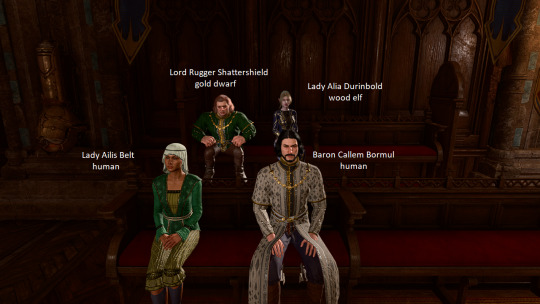
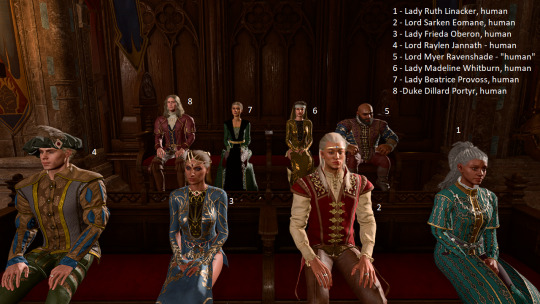
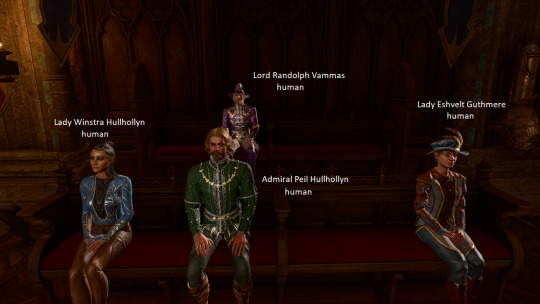
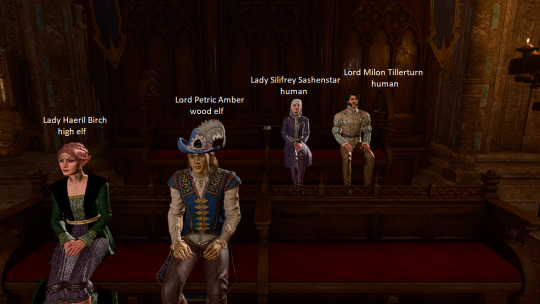
The characters marked by ** aren't human, which is interesting because the information I found said all the patriar familes are human except the Shattershields. Myer Ravenshade is listed as human if you examine him, but he has a dwarf model. That might be a mistake, but I'm including him anyway. Alia Durinbold, from a presumably human patriar family, is a wood elf. Again, this could be a mistake, but unless Larian winds up changing it, it could mean that interracial marriages that once may have been looked down on are now becoming more acceptable. Petric Amber is also a wood elf, and Haeril Birch is a high elf.
Those last two are interesting because they are the only ones in the boxes who aren't patriars. If not for them, I'd have assumed the coronation was simply a demonstration for the patriars. Their inclusion means this is something else.
Digging around, my conclusion is that all the listed people are members of the Parliament of Peers--a 50 person advisory party to the Council of Four. However, what I found says that it's pretty rare for all 50 to attend meetings, and the usual group is between 20-30. There are exactly 20 named individuals listed, plus a group of unnamed "patriars" standing at the front.
Here they are, for what it's worth:
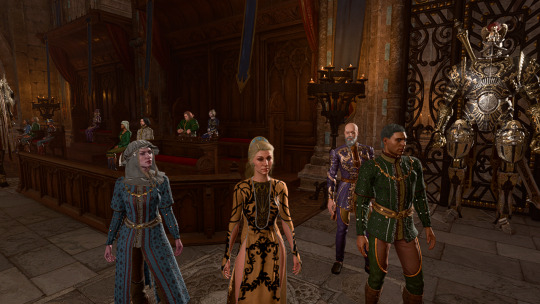

One thing I noticed here is that most of those listed here are Lord/Lady, but there are three other titles: Duke, Baron and Admiral. I've already talked about the Dukes. Looking into the patriars, the Hullhollyn family are notable for having a fleet of ships, so it makes sense that one of them would be an Admiral. That leaves the Baron.
I couldn't find anything about what it means to be a baron in Baldur's Gate. Going on real-world peerages, a baron/ess is generally the lowest "rank" of nobility. Basically, it's someone who was an official landowner (usually of an "important" bit of land) under the feudal system. Well and good, I suppose, but presumably all the Lords and Ladies of the patriars own land within the city. This particular Baron is also a patriar, but given that one doesn't need to be a patriar to become a Duke (normally a higher peer than a baron), that may not mean anything. We don't see any other titles between Duke and Baron, so what does that mean?
This isn't canon, but my assumption is that it means the Baron owns important land outside of the city. This would make sense for Baron Bormul, given that the Bormul family apparently have investments in silver mines and vineyards. Assuming they own the mines/vineyards, that may make those lands "important" enough to the city for their owner to earn a title. Alternately, the Bormul family also has counterparts in Amn, so maybe baron is an Amnian title that got passed along. That's getting a bit far afield for me, though. 🤷♀️
Anyway, among the group at the coronation, pretty much everyone supports Gortash becoming Archduke, with the exception of Lady Sashenstar (an old woman who really isn't too impressed with this commoner) and Duke Portyr, who expresses some hesitation at the whole thing.
Duke Portyr is interesting here. Except for Ravengard (who is thralled and conducting the ceremony), Portyr is the only Duke present. Now, Stelmane is already dead, so that explains her absence. Vanthampur is also missing, which is interesting. Portyr first, though: he was Grand Duke before Ravengard. He's the one who re-instituted the Parliament of Peers to make the day-to-day decisions of running the city, and ceded the title of Grand Duke to Ravengard. He's described as being conflict-averse, so it makes sense that he'd go along with Gortash's coronation, even though he's clearly unhappy about it. Also, the current leader of the Fists is also a Portyr, likely still Liara Portyr, the Duke's niece and Ravengard's second-in-command.
Thalamra Vanthampur is an interesting character, too. She's the head of the Vanthampur family, and part of the Descent into Avernus story. Apparently, she's the one who got Ravengard to go to Elturel before it sank to the Hells, intending to take his place as Grand Duke. From what I read, she also conspired with the Dead Three's cults to murder people in a bid to discredit the Flaming Fist. (The murdery bits were undoubtedly left to Bhaal's cult.) We never do find out anything about Thalamra Vanthampur in this game (I assume that's probably cut content). The only Vanthampur we do meet is Carnelia Vanthampur, who is in the Guildhall and describes herself as "a peer of the Parliament". She's willing to work with either the Guild or the Zhentarim. Nervously of course. Also interesting is that, on the Bloodstained Parchment hit list, is a Varri Vanthampur, whose gravestone you can find in Candulhallow's Tombstones shop, reading: "Varri Vanthampur. Unwanted in life, welcomed in death."
Interesting, hm?
Also on that hit list is Fridrik Hhune. The Hhunes apparently have links to the Knights of the Shield, from what I looked up--the same group the Emperor led with Stelmane. The only Hhunes we meet in-game are Blaise and Gheris Hhune, two of the werewolves in Cazador's ballroom who are brothers according to the dev notes. With them is another werewolf of a different patriar family, Duver Rillyn. This suggests Cazador has been going after members of patriar families, which sort of fits with what we know about his plans. We really don't find anything else out about them except that they consider Cazador to be their master and Astarion says they're new.
We also can talk to a Flaming Fist who mentions that Hurlbut Hhune is the father of Henrietta Hhune, who used to be secretly engaged to the Fist in question, only for her father to decide to arrange her to marry fellow patriar Derque Rillyn, who the Fist describes as "a major arsehole."
That conversation is interesting for a few reasons. For one, it tells you that arranged marriages within the patriar are a thing. Also, this Fist is a Manip (essentially a Sergeant) who can't ask the other Fists for help because "the Fists don't mess with wealthy patriars, they've got the Watch to back them up." That's aligned with what Devella can also tell you: "There are patriars on the murder target list. I'm oathbound to secure them first, so I'll be heading to the Upper City next." If you say that the Fist should protect everyone: "Not from around here, are you? We're in Baldur's Gate - this is just how things work."
This brings me back to my original issue: what is a Baldurian noble? The patriars are canonically nobles, of course, and they're undoubtedly seen as the "most important" of the nobility. From there, it's not much of a stretch to say that anyone who has earned the title of Duke is now a noble, even if they aren't patriars. I'd go so far as to say anyone on the Parliament of Peers (and their family by association) is a noble, given that non-patriars Petric Amber and Haeril Birch are considered Lord and Lady. The information I found about that is that there ae approximately twelve non-patriar members. If Amber and Birch are two of them, that leaves another unnamed 10.
Personally, I'd also assume that branch families of the patriars probably also count as nobility. By branch family, I mean those that marry out of the main line but whose ancestry stems from a patriar family. From what I've seen by naming conventions, Baldur's Gate uses patronmyic lineage--ancestry is passed to the sons, and wives take their husband's surname. So, if a daughter marries out of the family, she'd no longer be a part of her father's family lineage, but still be considered nobility. These families are likely independently wealthy, which would make them a good political/financial choice of alliance. These families are also probably the ones most likely to find a place on the Parliament, too, but likely have to jockey for position when their "representative" dies and a new opening in the Parliament is created.
Anyway, this may all be way off base. This is just me trying to make sense of something that I feel wasn't really very clear. Lore nerds, feel free to tell me where I've screwed it up and I'll fix it.
If you've read this far, as a treat you can have some crappy close-up portraits of the nobles at Gortash's coronation, grouped together in their respective boxes. 😚
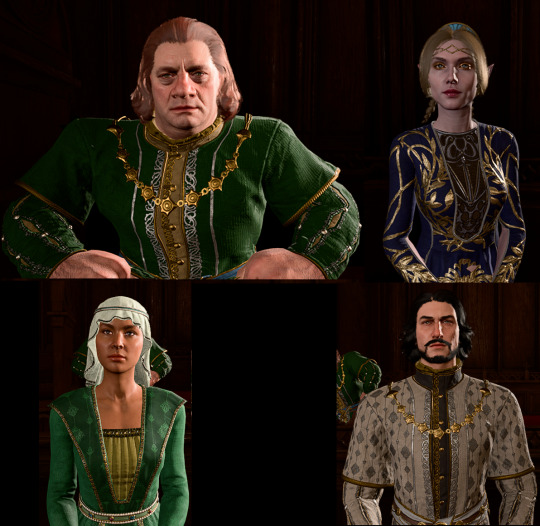
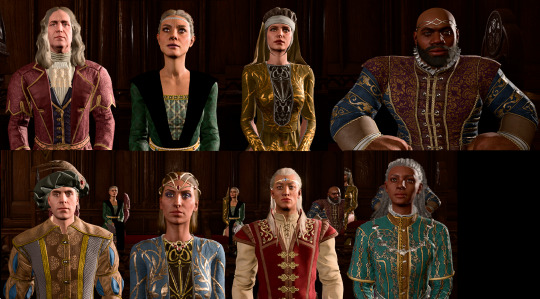
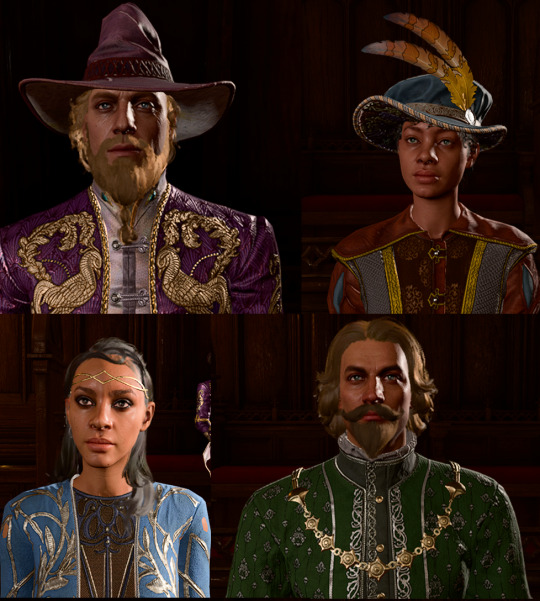
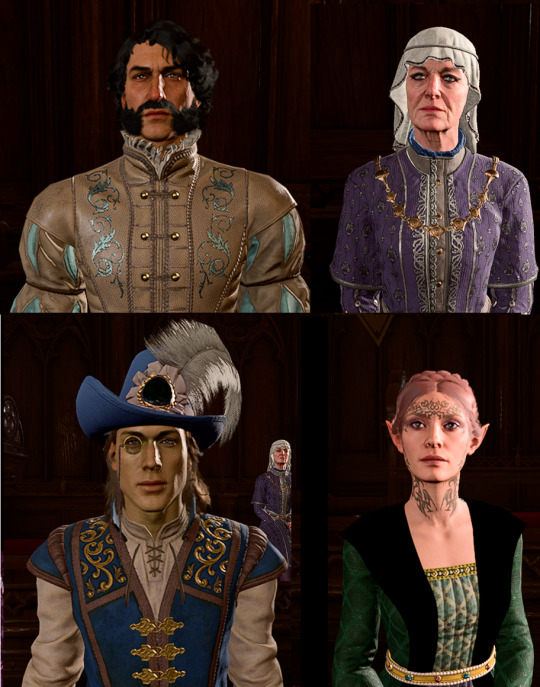
* For what it's worth, I'd count myself as a casual DnD player. I have some knowledge of DnD--I've played BG1 and 2, Planescape: Torment, along with some general cultural osmosis. I've had friends who played the tabletop version, but for one reason or another, I've never played it myself.
230 notes
·
View notes